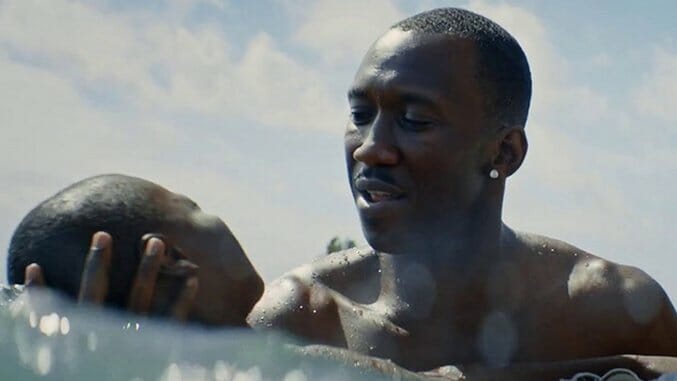Moonlight

What’s remarkable about Barry Jenkins’ Moonlight is that it’s hardly remarkable at all. It’s actually mundane, though its mundanity can be mitigated—or, really, delineated—via qualifiers: buoyant, bitter, graceful, beautiful, harsh, coltish, doleful, vibrant. More to the point: Moonlight is familiar. If you strip away its exterior particulars, you’ll be left with the bones of a coming-of-age story. (And if you’re into fancy European labels, you might call that story a “bildungsroman,” wherein the principal character’s emotional growth is traced over the course of formative years, even decades.) Every film has a skeleton to support its musculature. Moonlight’s just happens to look like Boyhood’s and The 400 Blows’.
And yet, Moonlight plays around with the passage of time in its protagonist’s life, but it isn’t Boyhood. It also isn’t The 400 Blows, even though Jenkins borrows that film’s final shot as the capper for his. Instead, Moonlight is Moonlight, Jenkins’ personal coming-of-age vision, a film that’s all about growing up black in Miami, an experience he shares in common with playwright Tarell Alvin McCraney, whose play In Moonlight Black Boys Look Blue provides the basis for Jenkins’ own production. Jenkins is straight. McCraney is gay. Moonlight is the corner where their lives intersect, where the details of Jenkins’ upbringing meld with McCraney’s, and thus makes discerning where one man’s story begins and the other’s ends a tricky feat.
Don’t bother untangling those specifics, though. Jenkins’ creative union with McCraney lends Moonlight a seamless universalism: The implicit statement is that their story is the story of many a black youth living in the Magic City, though of course the film has a focal point in its protagonist, Chiron—“Chi” like “shy,” “ron” like the Rhône—played by a trio of actors across three different segments set in three separate periods of his life, each titled using the appellations best suited to him from one chapter to the next: “Little”; “Chiron”; “Black.” He is portrayed as a child by Alex Hibbert, as a teen by Ashton Sanders and as a man by Trevante Rhodes, each bringing singular quiet flourishes—emphasis on “quiet”—to Chiron’s reserved persona while still maintaining a consistent individualism.
Their ensemble performance is an impressive achievement, but it’s an achievement that’s nearly impossible to articulate. Moonlight is painted with brushstrokes of silence: of Jenkins’ unobtrusive direction, of Chiron’s mute trepidation, of his friends and caregivers, who speak to him in the knowledge that he’ll say little and less to them in return (if he says anything at all). The film’s loudest components tend to be the sources of Chiron’s torment, whether it’s his drug-addicted mother, Paula (Naomie Harris, fracturing as easily as a porcelain doll), or his bully, Terrel (Patrick Decile). Nothing, of course, causes him as much turmoil as his uncertainty of self, and that element is rendered chiefly in tones of hushed apprehension.
-

-

-

-

-

-

-

-

-

-

-

-

-

-

-

-

-

-

-

-

-

-

-

-

-

-

-

-

-

-

-

-

-

-

-

-

-

-

-

-








































